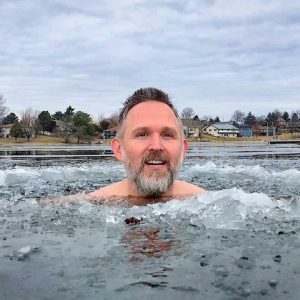
life
So, it’s been almost two years since a global pandemic was declared. I see myself typing that, but I can hardly believe it’s been that long.
To say that it’s been a hard two years would be a major understatement. It’s been challenging, painful, severe (and other words I found in the thesaurus).
Personally, I got the dang coronavirus twice. Yuck. The first time seemed to take forever to get over. My whole family got it. The aches and pains, the fatigue, the loss of taste and smell. It sucked.
Then, seven months later, I got it again. Not nearly as bad, of course, but it set me back a few days.
My aunt wasn’t as lucky as I was. She got it, went to the hospital, and never came home. My cousin followed her to eternity shortly after. Then, my lifelong friend Jason passed away from it just a few weeks later.
Losing someone you love is like having a piece of your heart torn out and, no matter how hard you try to repair it, that piece is still missing, and it just hurts like hell.
But, this pandemic will pass. In fact, the numbers, in the state I live in, are dropping rapidly, and our mask and vaccine mandates are expiring at the end of the month.
However, I’ve seen something emerge from this pandemic that I’m afraid will linger long after the virus is no longer a serious threat. And, in my opinion, will cause lasting damage that is more severe and dramatic than the losses I’ve already faced.
It’s the toxic cocktail of fear and judgment. I’ve never seen more of either in my entire life.
We fear what we don’t understand. We judge what we don’t understand. We judge what we fear. I’ve seen people act out of fear and judgement in ways that have destroyed health, close churches, done psychological harm, and even split families.
Let me give you an example. Someone fears that their rights are being taken away, so they post a meme on social media that makes a judgement about the president. It alienates half their friends, and then they wonder why those people don’t want to get together anymore.
Or, someone judges those who decline the vaccine, calling them unloving or science deniers. So, their friends who opted out because they have natural immunity, or whose doctors have advised them to wait, feel judged and misunderstood, and the divide becomes greater.
I’ve heard people call mask-wearers idiots (more judgement). I’ve seen people refuse to allow family members in their home because they’re not vaccinated (fear).
For churches, it’s been “Damned if you do. Damned if you don’t.” When churches decided to require masks and social distancing, they lost members who didn’t want to mask up. When churches decided to let people decide for themselves about masks and social distancing, they lost members who didn’t feel the church was doing enough to keep those virus-laden droplets in check. In a place that is supposed to be free of fear and judgement, the toxic duo ran rampant, and those who needed the church suffered because fearful, judgmental people took their volunteer time, their financial support, and their gifts and talents elsewhere. Everyone lost because of fear and judgement.
Most of us live with a strange confidence that our bias is right, and conflicting biases are wrong. It’s tragic, really. When we encounter someone with a different bias, we fear and/or judge them.
Maybe it’s the Dunning-Kruger effect. It’s a cognitive bias in which people believe that they’re smarter than they really are. People read a few news headlines and watch a few YouTube videos, and suddenly they’re medical experts who think everyone should respond to the pandemic they way they believe is best, or they’re wrong.
It’s strange. I knew a congressman. He died a couple of years ago. I used to love to chat about politics with him. You know what? He never spoke with the kind of over-confident, judgmental tone that most non-politicians I know speak with. I also know many pastors (and have been one myself for 25 years). None of the pastors I know speak with the authority and high-mindedness that critics of the church do. Even the medical professionals I know do not speak about the pandemic with the kind of confidence and passion that people who have read a few news articles do.
I think, when we’re operating out of fear and judgement, we forget something important. We forget that we don’t know everything. We forget that we’re wrong. In fact, we get so much in life wrong that it’s astounding. An old friend used to tell me, “When we get to heaven, we’re going to find out we were all wrong.” I wish we didn’t have to wait until we got to heaven to discover that.
What’s my point? most people don’t know jack. The experts I know acknowledge that they don’t know everything. What makes you (or me) think that you can take a complex, global issue, with infinite nuances and facets, and judge someone for not responding the way you would? Maybe it’s that Dunning-Kruger effect.
Whatever the reason, if we are going to keep this toxic mix of fear and judgement from wreaking destruction for many more years to come, we have to do a couple of things.
First, we need to acknowledge that we’re wrong. That’s what wise, humble people do. They admit they don’t know everything. They’re humble enough to change their stance if new evidence presents itself. At the very least, they can say, “I might be wrong here.” And that possibility makes it easier to respect those with a different perspective than you. Come on. Say it with me, “I might be wrong.”
Second, we need to develop better personal observation skills. I know this is next level, but you can do it. Recognize when you’re responding in fear. Catch yourself when you’re being judgmental, and call yourself out on it. Some people like to hear themselves speak, but they seldom really like to listen to themselves. Are you using judgmental language? Are you accusing others of being unloving, being an idiot, being uncaring, egotistical, arrogant, dishonest? Do you catch yourself believing that you can do it better than the person you’re criticizing? Try to catch yourself using fearful or judgmental language so that you can make a mental course correction.
This stuff is important! We, and future generations, need us to shed off fear and judgement.
And, for the love of all that is holy, stop cutting people out of your life over pandemic-related stuff. You’re doing more damage than a virus ever could.
But, I could be wrong. 🙂

life
One of my favorite quotes is by Saint Irenaeus and it goes like this, “The glory of God is man fully alive”.
I know it’s actually a miss-quote but I really like it anyway. The expression “fully alive” really inspires me. It reminds me of Christ’s offer of a rich and satisfying life. It also makes me think of how many of us aren’t really fully alive. We’re alive in the sense that our hearts are beating and we’re walking around, but we’re plagued by unfulfilled hopes, abandoned dreams, and lives that make little to no impact on the world around us. When our ideas of a good time are watching TV or taking the edge off with alcohol, then we’re missing out on a whole lot of actual living.
It seems more like we’re kind of alive but not fully.
There are many reasons why we don’t live fully. Too many to list here. But I thought I’d share four things with you that might help you move to a greater place of fullness in your life.
Never let shame settle in.
Nothing sucks the life out a person like shame. Shame over our appearance, shame over our lack of anything, and especially shame over our actions. I had a conversation the other day with a friend who was wrecked by shame because he lost his temper at work. It’s like he was stuck in that moment, unable to enjoy life. You can’t live fully and hold onto shame at the same time. You can’t learn from your mistakes either. Accept God’s forgiveness, forgive yourself, grow from it, and get back to living.
Don’t compare.
Comparison can be deadly. For years I struggled with comparing myself with my peers in the same age group. Most of my friends owned houses before I did, they made more money than me, and generally seemed to be enjoying life a whole lot more. In addition, my pastor friends seemed to be reaching more people than me, and I imagined that there was an excitement about their ministries that made mine seem boring. When I learned to accept the uniqueness of my own journey, and that God’s blessing and favor were on my life, regardless of my own definitions and expectations of success, I could stop comparing, and start enjoying life right where I was.
Give yourself permission to dream.
Disappointment happens. And the older you get, the more disappointments stack up and it’s easier to stop dreaming than it is to keep getting your hopes up. We focus on failures, missed opportunities, and unfulfilled hopes instead of believing that the best is yet to come. By the way, no matter how old you are, it’s still okay to believe that the best is yet to come. Dream! Have big hairy ideas. Set audacious goals and go for them. Without a vision, we parish so keep dreaming!
Appreciate where you are while taking steps to move forward.
How often do we look around ourselves and express gratitude for where we are in life, and how God has taken care of us? Gratitude is the gateway to joy and appreciating where we are gives us an excitement for what’s next. But don’t stay where you are, keep moving forward. Read another book, take another step, create strategies for reaching your goals and act on them. I heard once that a rabbit’s heart beats just as fast the day before it dies as it does when it’s younger. It keeps moving and running until the end. I want to be like the rabbit. God forbid that I ever choose to bench myself and spend my days watching TV and complaining that I’m too old. There’s just too much life to live!
I hope you choose to live a life that’s fully alive. I hope you accept God’s best for you, dream big, live gratefully, and never stop moving forward!

Growth, life
“If it’s not growing, it’s dying.”
At least that’s what I’ve heard said, and I think there’s a lot of truth to that statement.
I like to play the guitar. I’ve noticed that, if I don’t practice regularly, my skill level doesn’t stay at it’s peak. Instead, it declines until I get myself on a regular practice routine again, and then it starts to grow.
Wouldn’t it be cool if you could exercise and eat right until you had the body you desired, and then it just stayed that way forever? Heck yes it would!
We were designed to grow. It’s what we’re meant to do. Growth makes us happy, makes us healthy, and makes us wise. When we set goals to learn, to achieve, and to improve our health, we experience growth in the process of reaching those goals.
Unfortunately, many people just don’t grow. They get comfortable where they are and remain stunted, like 17 year-olds living in 30, 40, or 50 year-old bodies. This lack of growth often leads to discontent, relational dysfunction, and poor physical health. At the end of the day, life is just so much better when we make growth in our lives a priority.
I have found that there are four reasons why many people never grow. They are not huge obstacles, and anyone can overcome them. It just takes a little commitment to move forward toward being your best.
Personal growth requires humility.
Many people don’t grow simply because they don’t feel like they need to. Pride gets in the way of seeing areas of growth potential, and it’s just not teachable. When interviewing potential team members at our church, we always ask, “What do you think you could learn from being a part of the team?” If the answer is something like, “I think I could really help you guys out,” then that person doesn’t make the cut. Feeling like there is no need to grow is a sign of arrogance that usually leads to bigger problems down the road.
Personal growth requires an investment.
It takes time, energy, and sometimes money to intentionally grow. Want to grow as a parent? You’ll probably have to invest your time in reading a book. Want to grow in your physical health? You’re going to have to invest your energy into some exercise. Some people even invest their dollars into hiring a life coach when they want to see even greater growth. People don’t grow by just sitting there watching videos or trolling Facebook. It takes an investment. The investment, however, is totally worth it!
Personal growth requires focus.
We are such a terribly distracted culture. Our smartphones have set their hooks in us and we’ve become addicted to the dopamine hits we get from glancing from one digital novelty to the next. It requires focus to put down the phone and pick up a book. We must constantly make the decision to say no to momentary entertainment and say yes to personal growth. It is the only way to make the journey of growth without making a thousand unnecessary stops along the way.
Personal growth takes time.
Sometimes I’ll meet someone who refuses to take growth actions in their life because they “already tried that”. This usually means they went to the gym for a month or read the first two chapters of a book. Growth takes commitment. We can’t expect months (or years) of growth to take place from a half-hearted, commitment-less, weak-sauce attempt at improving our health, intellect, or spiritual condition. Make the commitment to stick to it until you reach the place you want to be!
That’s four but I know there are more. What are some obstacles you hit when attempting to grow? Share them below and we’ll talk about it.
Be teachable, make the investment, focus, and stay the course!

Goals, life
Have you ever felt stuck? I sure have!
Once, I spent over 5 YEARS trying to lose 10 pounds. I know that doesn’t sound like much, and you might be laughing at me right now for struggling with that for so long. I went to the gym faithfully, I used a calorie counting app, and I worked hard at reaching my target weight. My weight goal was behind a wall, and I just could not break through to it.
Every once and a while I’d get close. I’d drop a few pounds and, wham! Christmas would come. Or I’d go on vacation, gain it back, and struggle for months just to lose a couple pounds. Talk about stuck!
There are lots of ways to get stuck in life. We can get stuck in our health, in our relationships, our careers, and our personal growth, to name a few. It’s normal. It happens to the best of us and, if you’re feeling stuck right now, you’re not alone.
The danger is not in getting stuck. It’s in staying stuck. The problem is that, most of the time, we get stuck and only see one (or maybe two) ways to get unstuck. For example, I felt stuck in my weigh loss goals and believed the only way to get unstuck was through diet and exercise. It didn’t occur to me that there were other ways to lose weight.
Or, we might feel stuck in our career and believe the only way to get unstuck is going back to school. There’s something about being stuck that seems to limit our perspective, squelch creativity, and keep us from seeing the less than obvious options.
Today I want to give you a little exercise that you can do if you’re feeling stuck in a particular area. Are you ready? Let’s begin!
First, grab a sheet of paper and a pen. You’re going to do some writing. At the top of the sheet of paper, write “Ways to get unstuck in my ______________” Fill that blank in with the area you’re stuck in.
Next, as quickly as you can, you’re going to write out all the ideas that come to your mind for getting unstuck. Don’t worry about how crazy or unrealistic the idea is. The point is to warm up the ol’ noggin. Our brains are like muscles. If they’ve been performing the same actions, thinking the same thoughts, and haven’t been forced to think creatively in a while, then they need some exercise.
Set a timer for 5 minutes and just start writing!
For example, if you’re trying to lose a few pounds, you might write:
Work out 30 minutes a day
Take a walk after work
Eat only salad for a month
Fast
Take cold showers
Beat up Jillian Michaels
Drink a gallon of water a day
Give up soda and beer
Put up a mirror in the dining room so I can see myself eat (Yuck!)
Lock the refrigerator after 8:00pm and give my spouse the key
Get a Wii Fit
Park far from the door when I go shopping
Only take the stairs
Sweat to the oldies
You get the picture! Keep on writing until you have wrung out every last idea you can think of, or until the 5 minutes is up. If you want to really put the process on steroids, then ask a friend to join you.
Once you have your list, start eliminating the crazy ones. I’m certain that you will find at least one idea in your brainstorming list that is doable, maybe even enjoyable, and that you didn’t think of before. If you struggled with it, that’s okay. Like I said, your brain is a muscle, and this is a great way to exercise it. Take a break and do it again. Maybe get some inspiration by googling “Craziest way to _______________.” The answer to getting you unstuck exists. Others have been where you are, and gotten unstuck. You can do this!
Once you’ve chosen your idea (or two) DO IT! Envision yourself free from this stuck area, make a plan, and take action. You will be so glad you did!
So, you might be wondering how I managed to lose that last 10 pounds after all these years. I’ll give you a hint:

Goals, life, Personal Growth
We all do it. We make goals that we hope will change our lives for the better.
Lose weight.
Write a book.
Get out of debt.
Launch a business.
Lean a new skill.
The world is full of people with unfulfilled dreams, goals, and desires. At the beginning of every year, around 62% of people make New Year’s resolution. Only 8% of those resolution makers actually follow through.
The problem with most of us is that we just don’t understand the process of moving from where we are to where we want to be. We’re pretty sure we know where we want to go but there’s a disconnect, and that disconnect keeps us living in the land of dreamers instead of enjoying success.
The following are seven questions that, if answered thoughtfully, will greatly increase your odds of accomplishing your goals, and moving from frustration to fulfillment. They are questions that successful people have been asking themselves for years (I didn’t make them up) and I think they’re really going to help you.
1. is my goal achievable?
Let’s be honest. Sometimes we have crazy dreams. Not everyone who tries to become the next great movies star ends up on the screen. Some people work their entire lives to accomplish something, and it never happens. The tragedy is that, if they would have applied themselves to something else, they probably would have experienced massive success. Asking the achievability question will help eliminate pining for things that just aren’t going to happen.
2. How will i measure my progress?
A great goal is measurable. Dieters can measure their progress with a scale. Writers can measure their progress by checking their word count. Sometimes measuring progress just means drawing a mark on the calendar for every day that you worked toward your goal, and try not to miss a day. Find a way to measure progress and measure it every day.
3. Where am I now?
It’s hard to know if you’re moving forward if you don’t have a clear picture of where you are. What is your skill level? What are your resources? What are your giftings and passions? What is your current quality of life? Take inventory and write it down.
4. What is the deadline?
Great goals have a deadline. It eliminates “pie in the sky”, and “someday” thinking and lights a fire under you to git ‘er done. Share your deadline with a friend and ask them to hold you accountable. I have a friend who’s goal was to write a Life Plan for himself. When he wasn’t getting it done, I challenged him to have it written by a certain date or he had to buy me lunch at the most expensive restaurant in town. You better believe he got it done!
5. What are my obstacles?
This is where we get real about what’s holding us back. Do you have a hard time getting out of bed early? That might be an obstacle. Do you lack knowledge needed to accomplish your goal? That’s another obstacle. Too busy? Too tired? Too broke? More obstacles. Write them down and start brainstorming ways to overcome them.
6. What skills or knowledge is needed?
This flows beautifully from question 5. Personally, I have never achieved a big goal without having to read at least one book, take a class, or seek out loads of information. The best goals usually require some growth on our part so get ready to learn and be stretched.
7. What is my plan?
This is where it gets fun. Grab a notebook and pen and start charting your course from where you are to where you want to be. Write the names of books you’ll read, obstacles you’ll overcome, and who you’ll include on the journey. Turn the dream into tasks, and break those tasks into smaller ones. What can you do, every day, that will lead you to reaching your goal? Make a plan, discipline yourself to live it out, and delight in your accomplishment when you reach it!
life, Personal Growth
I was recently invited onto a podcast to be grilled by the host for an hour.
I don’t know why, but conversations like this have always been difficult for me. I don’t answer questions “on the spot” very well, and I tend to freeze if the topic isn’t something I’m very knowledgeable about.
When I was younger, there were people in my life who would ask me questions about my faith, not in the spirit of exchanging ideas, but to try to make me look foolish. I honestly don’t know why your neighbor’s son was hit by a car, I’m not sure what happens to people who have never heard the gospel, and I have no idea if God can create a rock so heavy that even He can’t lift it.
Truth be told, I’m not much of a theologian. I’ve been reading through the Bible, over and over again, for around 30 years, and I’ve been in ministry for over 20. But I’m a Bible College dropout, and I’ve only read a small handful of books on theology. I know other people who are able to answer difficult questions much more concisely, and with greater confidence than I can.
Fortunately, the podcast was produced by a friend from our church, and it was done in the spirit of honest conversation, rather than an attempt to publicly debate me. Nonetheless, it was very uncomfortable. But, as I’ve been mulling the experience over for the last week, I’ve come to realize that there are some benefits to engaging in uncomfortable conversations.
They force you to really think. A lot of times, we just adopt our beliefs without giving much thought to them. We were taught certain things, they sounded good, and we accepted them. What we believe about God is the most important thing about us, yet we give more thought to the shoes we buy than the faith we buy into.
They make you dig deep. Let’s face it, most conversation we engage in is pretty shallow. It doesn’t take much thought, and doesn’t challenge us. But an uncomfortable conversation is like a workout. We have to search our memory for information we’ve read, observations we’ve made, and evidence we’ve accumulated. This is especially true if you don’t want to give answers like, “because the Bible says so” or “just because”.
They challenge you to decide where you really stand. I know that it’s important to pick your battles wisely. However, it’s also important to know what you believe, and not be wishy washy on certain issues. That doesn’t mean we become dogmatic or inflexible. It just means we move toward becoming established in our beliefs about what is important to us.
Lastly, uncomfortable conversations are humbling. I mean this in a good way. If you approach an uncomfortable conversation in the right spirit, you have the opportunity to learn what you don’t know, and you can start growing in that area. In the instance of the podcast, I was inspired to do some reading on the issues we talked about. I don’t want to merely postulate or philosophize. I want to actually know what I’m talking about.
If you’ve been avoiding uncomfortable conversations, I would encourage you to kindly engage in one in the near future. They are, well…uncomfortable, but so is exercising and learning new skills. Give it a try!
If you’d like to listen to my uncomfortable podcast conversation, click here.








